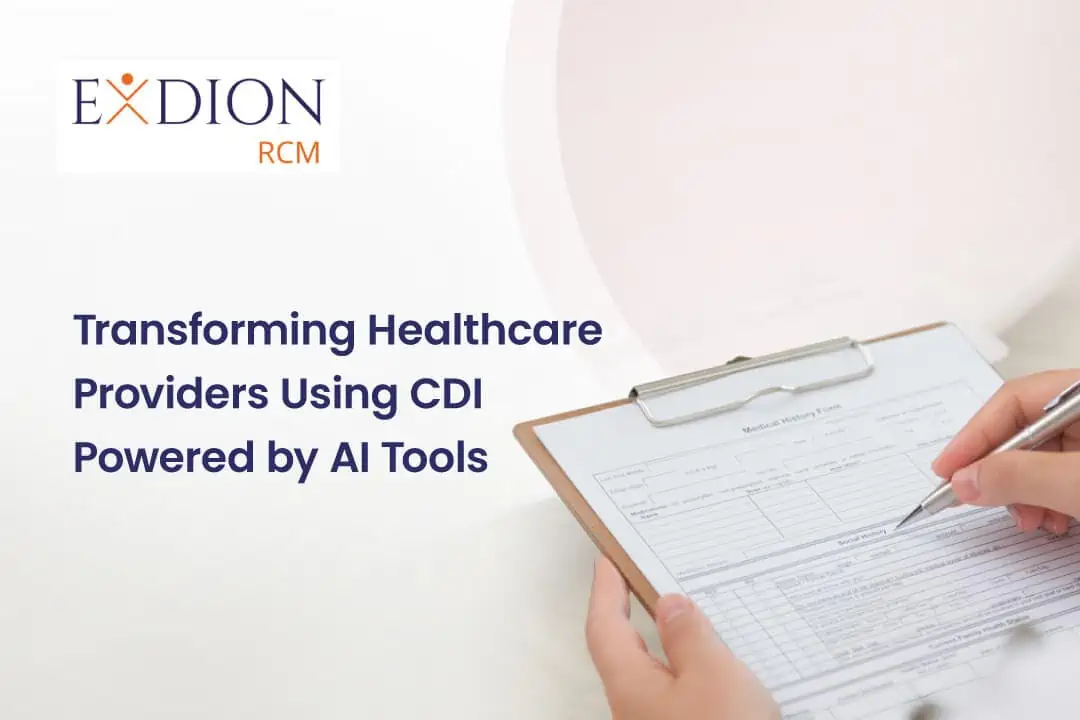
Transforming Healthcare Providers Using CDI Powered by AI Tools
The transition of healthcare practices to value-centric care has made technology indispensable in the healthcare industry. In the modern era, advanced technologies such as AI (Artificial Intelligence) solutions are designed towards supporting Clinical Documentation Improvement (CDI) teams in their quest to achieve greater efficiency. This blog talks about how having a well-structured approach aided by technology can help healthcare providers transform their day-to-day operations.
Importance of AI-powered CDI In the Healthcare Industry
The CDI market is expected to reach around $4.5 billion by 2023, a CAGR of around 7.9 percent. Several nations around the world have begun embracing the notion of value-based care for improving their respective healthcare systems. Their entire focus has shifted to effective clinical documentation.
Accurate CDI has become the foundation of revenue streams for healthcare units and systems around the world. Incomplete or missing documentation of treatment or diagnosis can result in denied, partially paid, or delayed reimbursements from patients. In such cases, it becomes difficult for hospitals and clinics to sustain their medical practice. Incomplete documentation can also lead to legal, financial, and reputational damage and chances of being sued for fraud. Though the consequences of incorrect documentation can be damaging, the redeeming factor is that these issues can be easily avoided.
Factors to Consider While Transforming the Healthcare Sector
Hospitals and healthcare units should investigate specific factors that could lead to rejections or denial of claims. The huge volume of rejected or denied reimbursements requires serious consideration of the common bottlenecks leading to this. Some of these bottlenecks are:
Under or Over-coding: Under-coding hurts provider reimbursement and results in providers getting underpaid for their services. Under-coding can lose your healthcare practice a lot of money and leave a lot of revenue on the table.
Upcoding or over-coding violations include the assignment of expensive diagnoses or treatment codes for billing values that are higher than they should be. Both these practices are regarded as medical frauds and could eventually lead to legal complications and expensive fines.
Missing or Inaccurate Information: As the coding process impacts the revenues of healthcare units directly, it becomes imperative for organizations to ensure accuracy. Coders are expected to obtain accurate information out of medical reports while assigning the right diagnosis & treatment codes for every clinical identifier. The quality of code depends significantly on effective documentation by healthcare providers. Physicians usually have a heavy workload. As a result, inaccurate or incorrect information in a patient’s documentation could turn out to be a major threat for your healthcare practice.
Unbundling: Another fraudulent practice involves unbundling a particular code. Unbundling refers to using multiple CPT codes for individual parts of a procedure, either due to a misunderstanding or to increase payment.
Much like over-coding, unbundling can also lead to increased billing value.
Role of AI in CDI Programs for Healthcare
Handling Complicated Workflows: Artificial Intelligence (AI), Machine Learning (ML) and other related technologies have been designed to offer support to CDI teams towards improving their efficiency. AI can help your CDI system automatically capture complex cases while spending minimal time on them.
Impact Coding: AI helps in increasing the accuracy of coding to a significant extent. It helps in enhancing coder productivity by providing code suggestions, reducing the overall coding time, and streamlining workflows. It also ensures traceability of effective codes to ensure the process of auditing.
Real-time Data Access: Access to dashboards and analytics enables CDI professionals to access key data in real-time. Physicians can effectively influence positive patient care through Key Performance Indicators (KPIs) which deliver a competitive edge to the organization. This allows them to stay relevant.
Denial Prevention: Coders and CDIs can depend on cutting-edge AI tools to help early mitigation of denials. AI-recommended templates help CDI teams in effectively addressing denials when they happen.
Enhancing HCC: Hierarchical Condition Categories (HCCs) help identify in-patient and out-patient diagnoses and risks across various settings where the patient might receive treatment. HCC accuracy is crucial as it represents an entire population of patients.
AI tools can help ensure proactive management of HCCs while helping organizations always stay compliant. They will also allow organizations to recognize patients having HCC gaps while making a list of patients who did not visit each year. AI can identify every possible opportunity linked to HCCs.
The Exdion Health Edge
Healthcare practices need to harness the power of AI to automate the complete medical coding process and ensure revenue growth.
The Exdion Health platform is an all-in-one solution which offers multiple modules including an auto-coding module for high coding accuracy, a revenue Integrity module that leverages code relationship algorithms (ICD/CPT) and a CAPD module that drives CDI by recognizing E&M levels, medical decision making and missing documentation. Get in touch with us to transform your healthcare practice and boost revenue.


